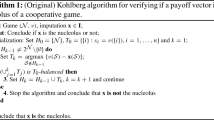Abstract
A game with restricted (incomplete) cooperation is a triple (N, v, Ω), where N represents a finite set of players, Ω ⊂ 2N is a set of feasible coalitions such that N ∈ Ω, and v: Ω → R denotes a characteristic function. Unlike the classical TU games, the core of a game with restricted cooperation can be unbounded. Recently Grabisch and Sudhölter [9] proposed a new solution concept—the bounded core—that associates a game (N, v,Ω) with the union of all bounded faces of the core. The bounded core can be empty even if the core is nonempty. This paper gives two axiomatizations of the bounded core. The first axiomatization characterizes the bounded core for the class G r of all games with restricted cooperation, whereas the second one for the subclass G bc r ⊂ G r of the games with nonempty bounded cores.
Similar content being viewed by others
References
Charnes, A. and Kortanek, K.O., On Balanced Sets, Cores and Linear Programming, Cah. Centre d’Etudes Rech. Oper., 1967, no. 9, pp. 32–43.
Charnes, A., Golany, B., Keane, M., and Rousseau, J., Extremal Principle Solutions of Games in Characteristic Function Form: Core, Chebychev and Shapley Value Generalizations, in Econometrics of Planning and Efficiency, Sengupta, J.K. and Kadekodi, G.K., Eds., New York: Kluwer, 1988, pp. 123–133.
Davis, M. and Maschler, M., The Kernel of a Cooperative Game, Naval Res. Logist. Quart., 1965, vol. 12, pp. 223–259.
Derks, J. and Reijnierse, H., On the Core of a Collection of Coalitions, Int. J. Game Theory, 1998, vol. 27, pp. 451–459.
Faigle, U., Core of Games with Restricted Cooperation, Zeitschr. Oper. Res., 1989, vol. 33, pp. 405–422.
Hwang, Y.-A. and Sudhölter, P., Axiomatizations of the Core on the Universal Domain and Other Natural Domains, Int. J. Game Theory, 2000, vol. 29, pp. 597–624.
Hokari, T., Consistency Implies Equal Treatment in TU-Games, Games Econom. Behav., 2005, vol. 51, pp. 63–82.
Gillies, R.P., The Cooperative Game Theory of Networks and Hierarchies, Theory and Decision Library 44, Berlin: Springer-Verlag, 2010.
Grabisch, M., Ensuring the Boundedness of the Core of Games with Restricted Cooperation, Ann. Oper. Res., 2011, vol. 191, pp. 137–154.
Grabisch, M. and Sudhölter, P., The Bounded Core for Games with Precedence Constraints, Documents de travail du Centre d’Economie de la Sorbonne 12006, Universit Panthon-Sorbonne (Paris 1), Centre d’Economie de la Sorbonne, 2012.
Kamijo, Y., A Two-Step Value for Cooperative Games with Coalitional Structures, Int. Game Theory Rev., 2009, vol. 11, pp. 207–214.
Katsev, I.V. and Yanovskaya, E., The Prenucleolus for Games with Restricted Cooperation, Math. Social Sci., 2013, vol. 66, pp. 56–65.
Llerena, F., An Axiomatization of the Core of Games with a Restricted Cooperation, Econom. Lett., 2007, vol. 95, pp. 80–84.
Owen, G., Values of Games with a Priori Unions, Lect. Notes Econ. Math. Syst., 1977, vol. 141, pp. 76–88.
Peleg, B., On the Reduced Game Property and Its Converse, Int. J. Game Theory, 1986, vol. 15, pp. 187–200; A Correction, Int. J. Game Theory, 1987, vol. 16, p.209.
Peleg, B. and Sudhölter, P., Introduction to the Theory of Cooperative Games, Boston: Kluwer, 2003.
Yanovskaya, E., Set-valued Analogues of the Prenucleolus, Int. J. Math., Game Theory. Algebra, 1998, vol. 7, no. 4.
Author information
Authors and Affiliations
Corresponding author
Additional information
Original Russian Text © E.B. Yanovskaya, 2014, published in Matematicheskaya Teoriya Igr i Ee Prilozheniya, 2014, No. 2, pp. 100–121.
Rights and permissions
About this article
Cite this article
Yanovskaya, E.B. The bounded core for games with restricted cooperation. Autom Remote Control 77, 1699–1710 (2016). https://doi.org/10.1134/S0005117916090162
Received:
Published:
Issue Date:
DOI: https://doi.org/10.1134/S0005117916090162



